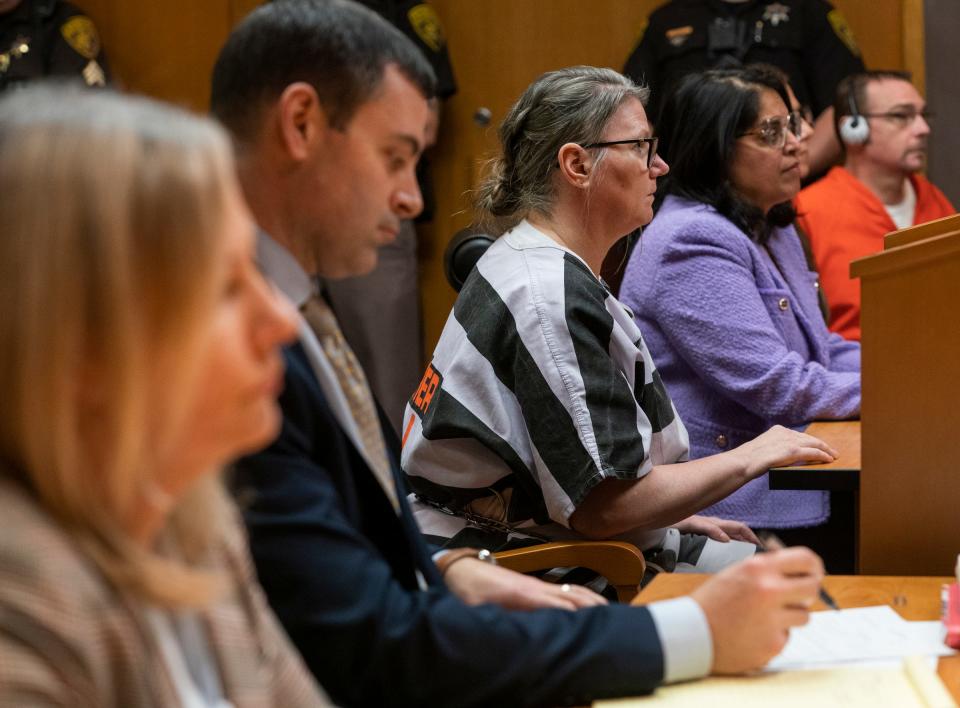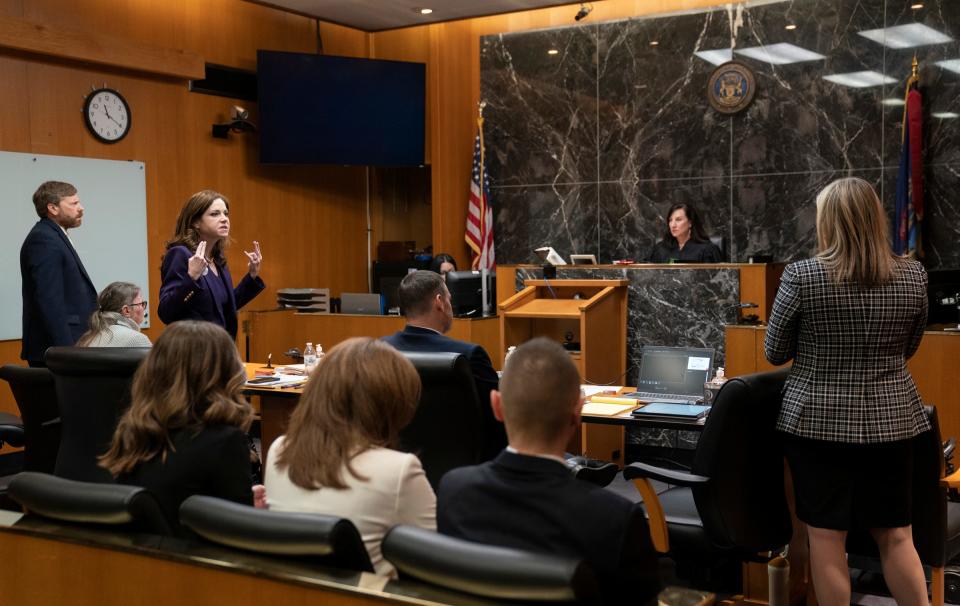Judge on historic trial of Oxford shooter's parent managing dust-ups, emotions in court
The nation is watching as prosecutors mount a historic criminal case against the mother of the Oxford High School mass shooter — and as Oakland County Circuit Judge Cheryl Matthews works to maintain calm in a tense courtroom, where the first two days of trial saw lawyers sparring, the defendant breaking down in tears and emotions running high.
Matthews is no stranger to sensitive and complex cases, given her lengthy legal career as a child sex crimes prosecutor and as a judge who has overseen a range of cases, but this is unlike any she has had before.
Matthews drew the straw two years ago on this case, which could make history as prosecutors seek to hold Jennifer and James Crumbley, who are facing charges of involuntary manslaughter, responsible for the deaths of four Oxford High School students killed by their son Ethan Crumbley in the 2021 massacre.
Jennifer Crumbley’s trial is up first and started last week. Prosecutors have shown messages where her son texted her about the house being haunted and seeing a demon, while she and her husband were riding their horses, and video of the parents going into Oxford High School on Nov. 30, 2021, to discuss a troubling drawing their son made, just hours before the shooting.
Heading into day three of testimony Monday, Matthews has already twice had to temper frustrations by attorneys, pleading from the bench: "Everybody needs to take a deep breath."
Who is Judge Cheryl Matthews?
Matthews was elected to the Oakland County Circuit Court in 2004 after working for several years in the prosecutor's office. She started as an assistant prosecutor in the Oakland County Prosecutor's Office in 1991 and later became chief of the office's child sexual assault section, according to her profile on the county's website.
When she was running for the bench, Matthews told the Free Press it was "a natural progression" for her, according to an October 2004 article. "I work to protect children and families every day, and I am in circuit court every day."
Her county profile also says she previously served as an instructor for the Oakland Police Academy, was a board member with the county's Child Abuse and Neglect Council from 1999 to 2005 and was twice appointed to task forces on children's issues: the governor's Task Force on Children's Justice from 1998 to 2004 and the governor's Task Force on the Prevention of Sexual Abuse of Children from 2014-15.
Matthews received a bachelor's degree from the University of Michigan in 1985 and her law degree in 1989 from Fordham University in New York, according to the county's website.
In her judicial career, Matthews has overseen a range of cases, including a headline-grabbing polygamy case; the case of a former Oakland University professor found guilty of running a drug house; and the case of a woman who pleaded guilty in the beating death of her husband and for beating the family dog.
In 2018, the Institute of Continuing Legal Education posted a Q&A with Matthews in a blog post where she said the best things a lawyer can do are in court are answer her questions about the case, be respectful and be on time. "I am on time and I expect them to be also," she said.
And the worst things a lawyer can do in the courtroom? "Talk over me or argue with me once I have made my ruling. I strive to always give the lawyers in my courtroom a good deal of time to argue their side of the case and answer my questions, but when I do make my ruling, it’s final."
Key rulings in the parents' case
In the Crumbleys' case, Matthews made several key rulings that determined what elements could be presented at trial and that prosecutors can't argue the parents put their son on a pathway to violence that led to his killing four students and injuring seven other people, crimes to which he pleaded guilty and has been sentenced to life without parole.
Prosecutors had sought to argue the "pathway to violence" through two mass shooting experts, but Matthews concluded the experts’ research was not reliable or relevant to the parents' case.

“Most paramount to this conclusion is the fact that experts admitted that they cannot predict what actions or inactions would stop a school shooting,” Matthews wrote in her 16-page opinion in November 2022. "Further, it is confusing and misleading to present the theory to jurors when the experts cannot say with any certainty whether any action or inaction by the (parents) in this case would have changed the outcome.”
Matthews also ruled that numerous elements will not be argued during trial, such as the mom's alleged extramarital affair, the couple's alleged "messy house" or their alcohol use; and that other elements would be admissible, including the shooter’s journal, and his Instagram and text messages he sent a friend in which he discussed his mental health issues.
The judge denied a request by the parents in 2022 to dismiss their criminal charges, concluding evidence is adequate for a "reasonable" juror to conclude that four students died due to their "gross negligence." That decision has been upheld on appeal. She also denied their request move the trial out of Oakland County, concluding they can get a fair trial in the community where their son carried out the deadly mass school shooting.
After the defense argued that Oakland County Prosecutor Karen McDonald was bad-mouthing the parents and hurting their chances of getting a fair trial, Matthews issued a gag order, prohibiting both sides from publicly discussing the case.
McDonald protested, saying she has a duty to inform the victims and public about the case, and to correct misinformation on the internet. Matthews disagreed.
"It's not a duty of the prosecutor to police the internet,” Matthews held. "It's your job to give the defendants a fair trial."
'Emotions are running high'
As jury selection in Jennifer Crumbley's case got underway, Matthews tried to connect with prospective jurors to make them feel at ease and not intimidated by the complex and often daunting environment of a courtroom. She talked about being a mother herself, and asked multiple individuals in the jury pool to consider whether they should be held criminally responsible for something their child did, “just because it’s your child."
“I have a 22-year-old, and he does some pretty stupid things,” Matthews said, noting she worries every day about her son driving, whether he’s on his phone and could possibly cause an accident.
She has also had to handle heated courtroom spats between the attorneys.
After Jennifer Crumbley broke down crying Thursday when she saw, for the first time, video of her son in the high school with a gun, her attorney Shannon Smith asked for a break. The jury was excused — then an argument ensued, with the prosecutor accusing the defense lawyer of “sobbing” and the defense lawyer saying “this is horrific. … We’re doing our best.”

“Everyone here is human,” Matthews said during the break, trying to restore calm. She said she knows it's excruciating. "I’m not a robot. I'm trying to keep myself from sobbing. I’ll do it at 6 o'clock tonight.”
Matthews said, "everybody needs to take a deep breath" — a message she reiterated Friday during another dust-up as the two sides argued over comments Smith made during her cross-examination of a witness. As she struggled with exhibits, Smith commented that she was "going to kill myself."
After testimony had concluded and jurors were no longer in the courtroom, prosecutors expressed concern about the comment. McDonald noted there were parents of teens killed in the shooting present. Smith defended herself and said she "did not mean it like that and they know I didn't mean it like that."
Matthews calmly said: "I think it was a slip of the tongue. ... Emotions are running high.”
McDonald said she was "simply asking that we be respectful to victims, that’s it.” Smith said she did not mean to offend the families and accused the prosecution of “putting the victims through reseeing all of this over and over and over.” McDonald said they “aren’t putting victims through everything” and are prosecuting their case in the most efficient way possible.
Matthews told the attorneys: “Everybody needs to take a deep breath and go home. Everybody go home. I’m going home.”
Contact Gina Kaufman: gkaufman@freepress.com. Follow her on Twitter: @ReporterGina.
Contact Tresa Baldas: tbaldas@freepress.com.
This article originally appeared on Detroit Free Press: Judge to attorneys in Oxford shooter's mom case: 'Take a deep breath'

